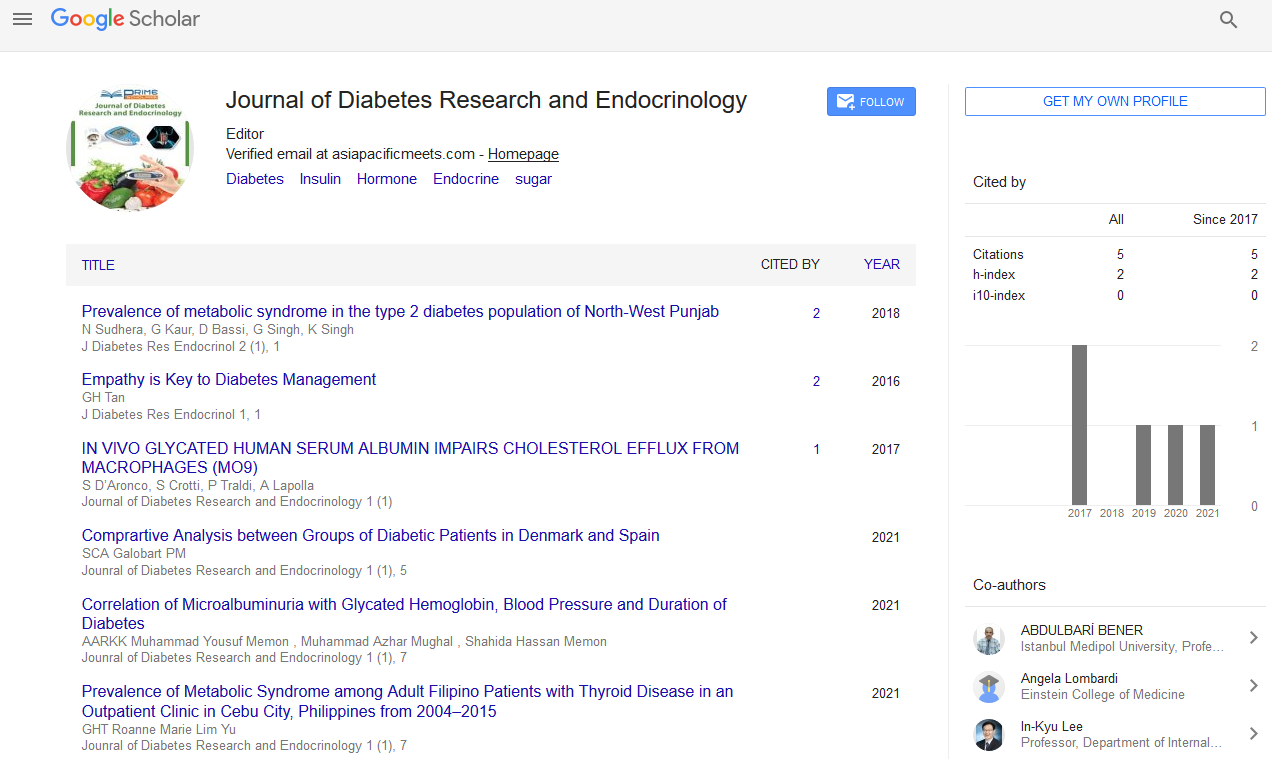Commentary - (2024) Volume 8, Issue 1
Genetic Insights into Diabetes: Implications for Personalized Medicine
Henry White*
Department of Endocrinology, Chichester University, UK
*Correspondence:
Henry White,
Department of Endocrinology, Chichester University,
UK,
Email:
Received: 28-Feb-2024, Manuscript No. IPJDRE-24-20062;
Editor assigned: 01-Mar-2024, Pre QC No. IPJDRE-24-20062 (PQ);
Reviewed: 15-Mar-2024, QC No. IPJDRE-24-20062;
Revised: 20-Mar-2024, Manuscript No. IPJDRE-24-20062 (R);
Published:
27-Mar-2024, DOI: 10.36648/ipjdre.08.01.06
Description
Diabetes mellitus, a group of metabolic disorders characterized
by elevated blood glucose levels, affects millions of people
worldwide. While environmental and lifestyle factors play
significant roles in the development of diabetes, genetic
predisposition also plays a crucial role. Recent advancements
in genetic research have provided valuable insights into the
underlying genetic architecture of diabetes, paving the way for
personalized medicine approaches tailored to individual genetic
profiles. This article explores the implications of genetic insights
into diabetes for personalized medicine. T1D is an autoimmune
disorder characterized by the destruction of insulin-producing
beta cells in the pancreas. Genetic susceptibility to T1D is
conferred by variations in genes involved in immune regulation,
such as HLA genes (e.g., HLA-DR, HLA-DQ), as well as genes
related to immune function and pancreatic beta-cell function.
T2D is a complex metabolic disorder characterized by insulin
resistance and impaired insulin secretion. Genetic factors
contribute significantly to T2D risk, with hundreds of genetic
variants identified through Genome-wide Association Studies
(GWAS). These variants primarily affect genes involved in
insulin secretion, insulin action, beta-cell function, and glucose
metabolism. Genetic risk scores based on multiple genetic
variants associated with diabetes can help identify individuals
at increased risk of developing the disease. This information
enables targeted screening, early intervention, and lifestyle
modifications to prevent or delay the onset of diabetes.
Genetic information can guide the selection of appropriate
pharmacological therapies for diabetes management. For
example, certain genetic variants may influence response
to specific antidiabetic medications, such as metformin or
sulfonylureas. Tailoring treatment based on genetic profiles can
optimize therapeutic outcomes and minimize adverse effects.
Personalized medicine approaches can be applied to diabetes
prevention efforts by targeting high-risk individuals with
interventions tailored to their genetic predisposition. Lifestyle
modifications, such as dietary changes and exercise programs,
can be customized based on genetic risk profiles to maximize
effectiveness. Genetic variants associated with diabetes risk can
inform personalized dietary recommendations. Nutrigenomic
approaches take into account individual genetic makeup to
optimize nutrient intake, regulate blood glucose levels, and
mitigate metabolic dysfunction. Genetic markers may also be
useful for predicting the risk of diabetes-related complications,
such as diabetic retinopathy, nephropathy, and neuropathy.
Early identification of individuals at increased genetic risk
allows for closer monitoring and timely intervention to
prevent or minimize complications. Diabetes is a genetically
heterogeneous condition, with multiple genetic variants
contributing to disease risk. Understanding the complex
interplay between genetic factors and environmental influences
poses challenges for personalized medicine implementation.
Genetic testing for diabetes risk may raise ethical and social
concerns related to privacy, discrimination, and stigmatization.
Ensuring informed consent, confidentiality, and equitable
access to genetic information is essential for responsible
implementation of personalized medicine strategies.
Integrating genetic information into routine clinical practice
requires interdisciplinary collaboration, including genetic
counsellors, endocrinologists, primary care physicians, and
other healthcare providers. Education and training are needed
to empower healthcare professionals to interpret and apply
genetic data effectively. Genetic insights into diabetes offer
promising opportunities for personalized medicine approaches
aimed at improving risk prediction, treatment selection,
prevention strategies, and early detection of complications.
By leveraging genetic information, healthcare providers can
deliver more precise and tailored care to individuals with
diabetes, ultimately leading to better outcomes and improved
quality of life.
Acknowledgement
None.
Conflict Of Interest
The author’s declared that they have no conflict of interest.
Citation: White H (2024) Genetic Insights into Diabetes: Implications for Personalized Medicine. J Diab Res Endocrinol. 8:06.
Copyright: © 2024 White H. This is an open-access article distributed under the terms of the Creative Commons Attribution License, which permits unrestricted use, distribution, and reproduction in any medium, provided the original author and source are credited.

